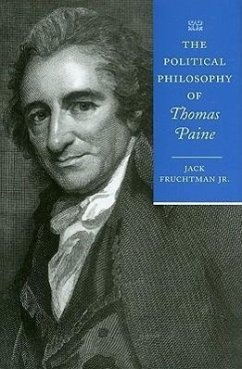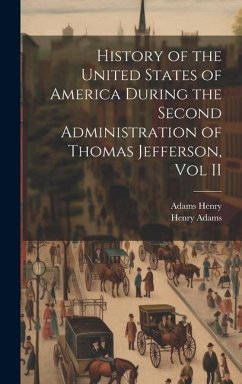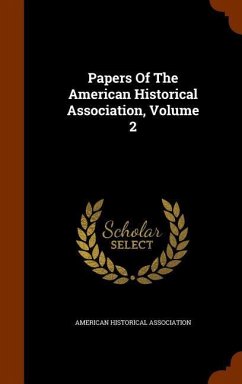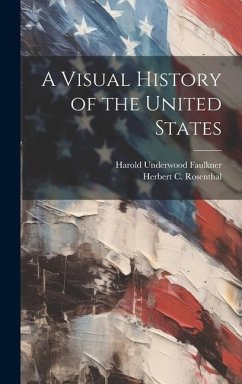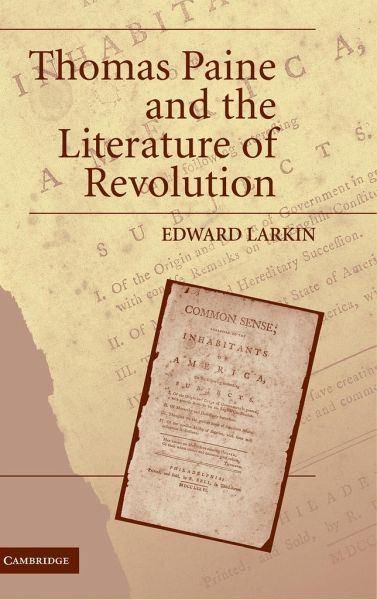
Thomas Paine and the Literature of Revolution
Versandkostenfrei!
Versandfertig in 1-2 Wochen
104,99 €
inkl. MwSt.
Weitere Ausgaben:

PAYBACK Punkte
52 °P sammeln!
Short description/annotationThomas Paine created a new literature of politics bridging political philosophy and everyday knowledge.Main descriptionAlthough the impact of works such as Common Sense and The Rights of Man has led historians to study Thomas Paine's role in the American Revolution and political scientists to evaluate his contributions to political theory, scholars have tacitly agreed not to treat him as a literary figure. This book not only redresses this omission, but also demonstrates that Paine's literary sensibility is particularly evident in the very texts that confirmed his i...
Short description/annotation
Thomas Paine created a new literature of politics bridging political philosophy and everyday knowledge.
Main description
Although the impact of works such as Common Sense and The Rights of Man has led historians to study Thomas Paine's role in the American Revolution and political scientists to evaluate his contributions to political theory, scholars have tacitly agreed not to treat him as a literary figure. This book not only redresses this omission, but also demonstrates that Paine's literary sensibility is particularly evident in the very texts that confirmed his importance as a theorist. And yet, because of this association with the 'masses', Paine is often dismissed as a mere propagandist. Thomas Paine and the Literature of Revolution recovers Paine as a transatlantic popular intellectual who would translate the major political theories of the eighteenth century into a language that was accessible and appealing to ordinary citizens on both sides of the Atlantic.
Table of contents:
1. Inventing an American public: the Pennsylvania magazine and revolutionary American political discourse; 2. 'Could the Wolf Bleat Like the Lamb': Paine's critique of the early American public sphere; 3. Writing revolutionary history; 4. The science of revolution: technological metaphors and scientific methodology in Rights of Man and The Age of Reason; 5. 'Strong Friends and Violent Enemies': the historical construction of Thomas Paine through the nineteenth century; Epilogue: Paine and nineteenth-century American literary history.
Thomas Paine created a new literature of politics bridging political philosophy and everyday knowledge.
Main description
Although the impact of works such as Common Sense and The Rights of Man has led historians to study Thomas Paine's role in the American Revolution and political scientists to evaluate his contributions to political theory, scholars have tacitly agreed not to treat him as a literary figure. This book not only redresses this omission, but also demonstrates that Paine's literary sensibility is particularly evident in the very texts that confirmed his importance as a theorist. And yet, because of this association with the 'masses', Paine is often dismissed as a mere propagandist. Thomas Paine and the Literature of Revolution recovers Paine as a transatlantic popular intellectual who would translate the major political theories of the eighteenth century into a language that was accessible and appealing to ordinary citizens on both sides of the Atlantic.
Table of contents:
1. Inventing an American public: the Pennsylvania magazine and revolutionary American political discourse; 2. 'Could the Wolf Bleat Like the Lamb': Paine's critique of the early American public sphere; 3. Writing revolutionary history; 4. The science of revolution: technological metaphors and scientific methodology in Rights of Man and The Age of Reason; 5. 'Strong Friends and Violent Enemies': the historical construction of Thomas Paine through the nineteenth century; Epilogue: Paine and nineteenth-century American literary history.







